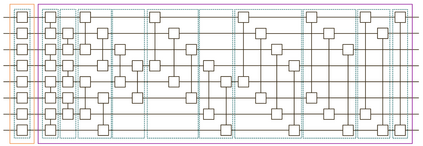We develop a fourth-order Magnus expansion based quantum algorithm for the simulation of many-body problems involving two-level quantum systems with time-dependent Hamiltonians, $\mathcal{H}(t)$. A major hurdle in the utilization of the Magnus expansion is the appearance of a commutator term which leads to prohibitively long circuits. We present a technique for eliminating this commutator and find that a single time-step of the resulting algorithm is only marginally costlier than that required for time-stepping with a time-independent Hamiltonian, requiring only three additional single-qubit layers. For a large class of Hamiltonians appearing in liquid-state nuclear magnetic resonance (NMR) applications, we further exploit symmetries of the Hamiltonian and achieve a surprising reduction in the expansion, whereby a single time-step of our fourth-order method has a circuit structure and cost that is identical to that required for a fourth-order Trotterized time-stepping procedure for time-independent Hamiltonians. Moreover, our algorithms are able to take time-steps that are larger than the wavelength of oscillation of the time-dependent Hamiltonian, making them particularly suited for highly-oscillatory controls. The resulting quantum circuits have shorter depths for all levels of accuracy when compared to first and second-order Trotterized methods, as well as other fourth-order Trotterized methods, making the proposed algorithm a suitable candidate for simulation of time-dependent Hamiltonians on near-term quantum devices.
翻译:暂无翻译







